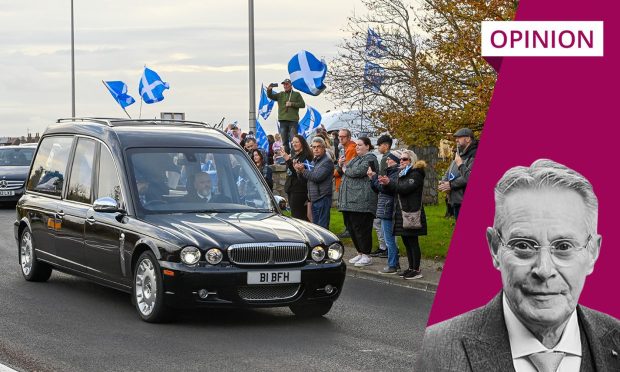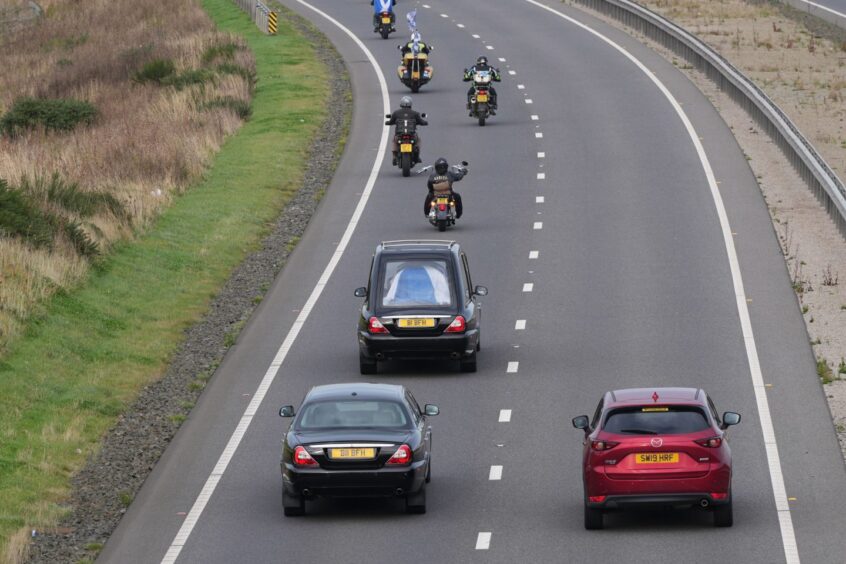I had anticipated the moment for the last mile or so, but when it came my heart missed a beat with shock and sadness.
It was just before three in the afternoon and I was driving back to Aberdeen from Hatton.
The giveaway was that we’d spotted a few people with saltires flapping in the wind on bridges above the A90, and in laybys and fields.
The penny quickly dropped: in seconds, I could see flag-bearing bikers approaching on the opposite side of the dual carriageway.
They were escorts to the coffin carrying Alex Salmond’s body north towards Fraserburgh, and his family home in Strichen.
They must have made a thunderous noise.
Fitting really, as Salmond created plenty of thunder in masterminding the SNP’s spectacular rise to power.
Although I knew what was coming – just like those tiny huddles at the roadside paying their respects – I was still shocked by the sight of his saltire-draped coffin hurrying by.
It was hard to accept he’d gone – a one-of-a-kind political warrior who ran rings around his opponents at his peak; a life snuffed out prematurely and totally unexpectedly.
Those few seconds as we passed stirred memories of my journalistic dealings with Salmond over the years.
Almost a decade ago on this very stretch of road I spent successive days thinking about nothing else but Salmond.
I was scurrying back and forth between Strichen and Aberdeen at the time.
One of a P&J team tasked with carrying out hours of exclusive interviews with the prince of independence to dissect the momentous aftermath of his crushing referendum defeat.
A bottle of wine with Salmond helped smooth over our disagreements
A prestigious assignment, but not the grandest of surroundings: we began in a private room above a Strichen bar and rounded off the “Salmond tapes” in a freezing village church hall a few weeks later in January.
It got off to a bad start with us rowing over something and nothing.
I feared the plug would be pulled on the whole thing, but a bottle of wine over lunch helped.
He was still clearly pained and drained by his referendum calamity weeks earlier.
Ruefully putting the loss down to former prime minister Gordon Brown’s late bodyswerve with “The Vow” – to make Scotland the most powerful devolved administration in the world as an alternative.
As I passed where Salmond’s coffin now travelled – in between those sessions – I agonised over how to extract the best material from this formidable man.
It was always going to be cat and mouse.
But I eventually concluded, “How do you outfox the wiliest fox in the forest?”
If only he had given me more of the answers I wanted to hear.
A lot has been said about a so-called fear factor driving that referendum result, but in the light of subsequent Brexit chaos, the “nos” might have been entitled – intuitively – to be wary.
But there was something even more scary facing wavering voters.
They were struggling to get answers, too.
Salmond’s perceived inability to answer fundamental questions convincingly – about currency, passports, hard trade barriers and forecasts of horrific economic austerity for years to come – put many off.
Neither could Sturgeon, Yousaf or Swinney in his footsteps.
Many couldn’t accept blithe assurances that it was all going to be milk and honey on Sugarcandy Mountain.
Despite being on the fringes for so long, I’ve heard some people hoping his tragic death acts as the catalyst for some kind of Conversion on the Road to Damascus.
To unite the country behind a new independence push.
Dream on.
He left Sturgeon with bucketfuls of momentum which she poured down the drain
The real momentum was already there 10 years ago when his loss inadvertently catapulted the SNP to even further soaring popularity.
He left Sturgeon with bucketfuls of momentum, but she poured it all down the drain.
The Marmite paradox of Salmond was that even though he was clearly outstanding in some respects he left the country as bitterly – and equally – divided now as it was during his referendum.
A lot of water has flowed under the SNP’s bridge since then; much of it murky and somewhat polluted by scandal, controversy and an abysmal domestic record leading to a resounding general election defeat.
People will bang the drum for independence again while seeking inspiration from Salmond’s death, but they can’t play the same old tunes on a broken banjo.
You could sense Salmond’s frustration from the sidelines, but he was also engrossed with trying to get even with Sturgeon over the sex case against him.
Salmond the statesman wrote an extraordinary chapter in Scottish history.
In his pomp, he was a maestro conducting the political orchestra pit.
But legal battles now in limbo remain unplayed like an unfinished symphony.
As to the unanswered fundamental referendum questions, I’ll leave it to the famous song from Casablanca.
“The fundamental things apply; As time goes by.”
And that’s not changed.
David Knight is the long-serving former deputy editor of The Press and Journal



Conversation